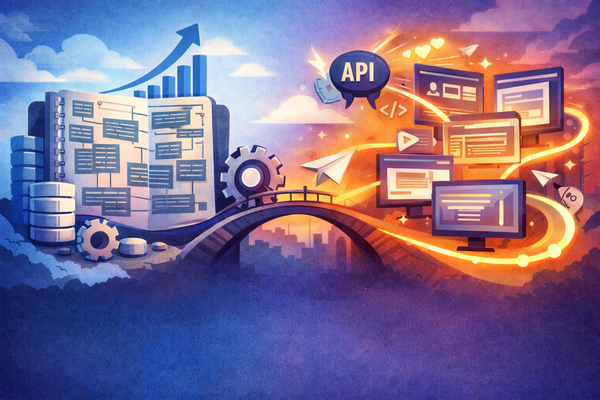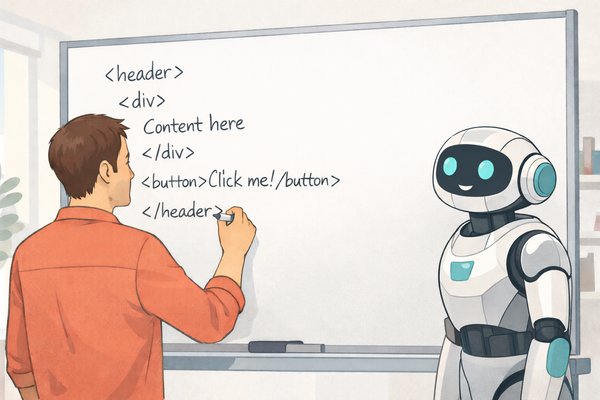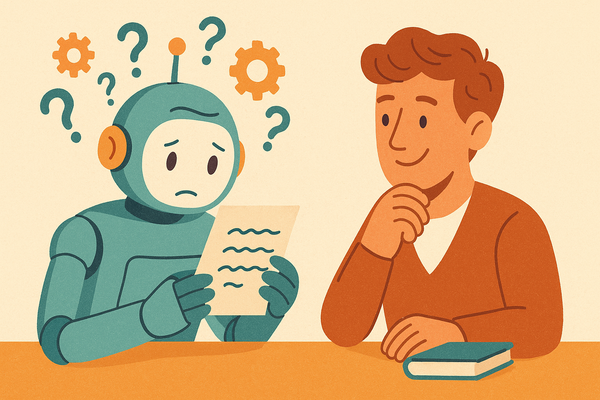The Programming Priesthood is Dead (And Good Riddance)
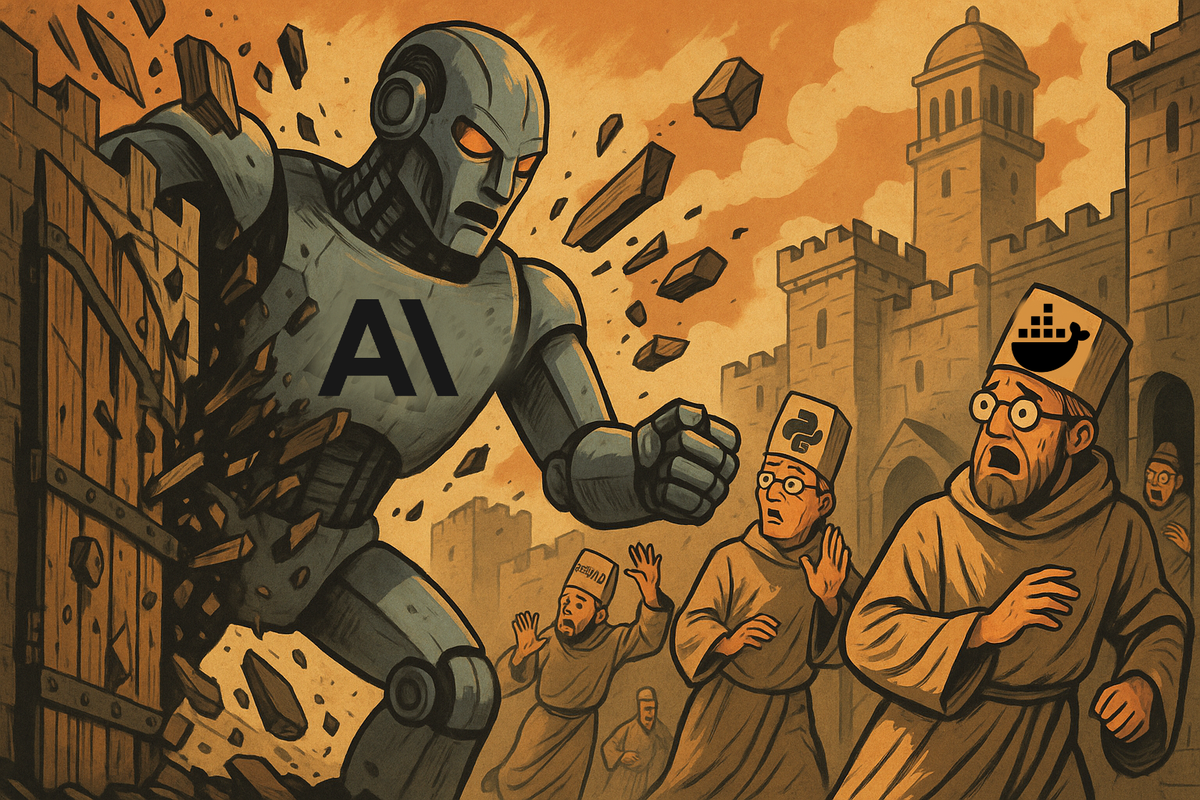
How AI coding is breaking down the gates of code creativity.
I was interviewing at this AI startup last month—you know the type, Series A funding, ping pong tables, and enough kombucha to fuel a small commune. The recruiter, a perfectly nice person who probably went to Stanford and considers herself "technical" because she spends her day in Excel rather than VSCode, looked at my background and said something that made me pause.
"Wow, you went from product management to engineering? I could never do what you do. I could never code."
And there it was. The perfect encapsulation of the biggest lie we've been telling ourselves in tech for the past two decades.
The Great Programming Con
Here's the uncomfortable truth that'll get me snubbed by the ML click hustling to close series A based on their Ivy degree and years as a JR dev at a fill in the blank FANG: We've been running a protection racket.
For years, we've convinced everyone—including ourselves—that programming is some mystical art form requiring superhuman intelligence, mathematical genius, and the ability to regurgitate solutions to LeetCode “mediums”. We've created elaborate hazing rituals (looking at you, whiteboard coding interviews asking people to reverse binary trees) and perpetuated myths about needing to master dynamic programming to build a web form.
Why? Because it keeps our salaries high and our job security intact.
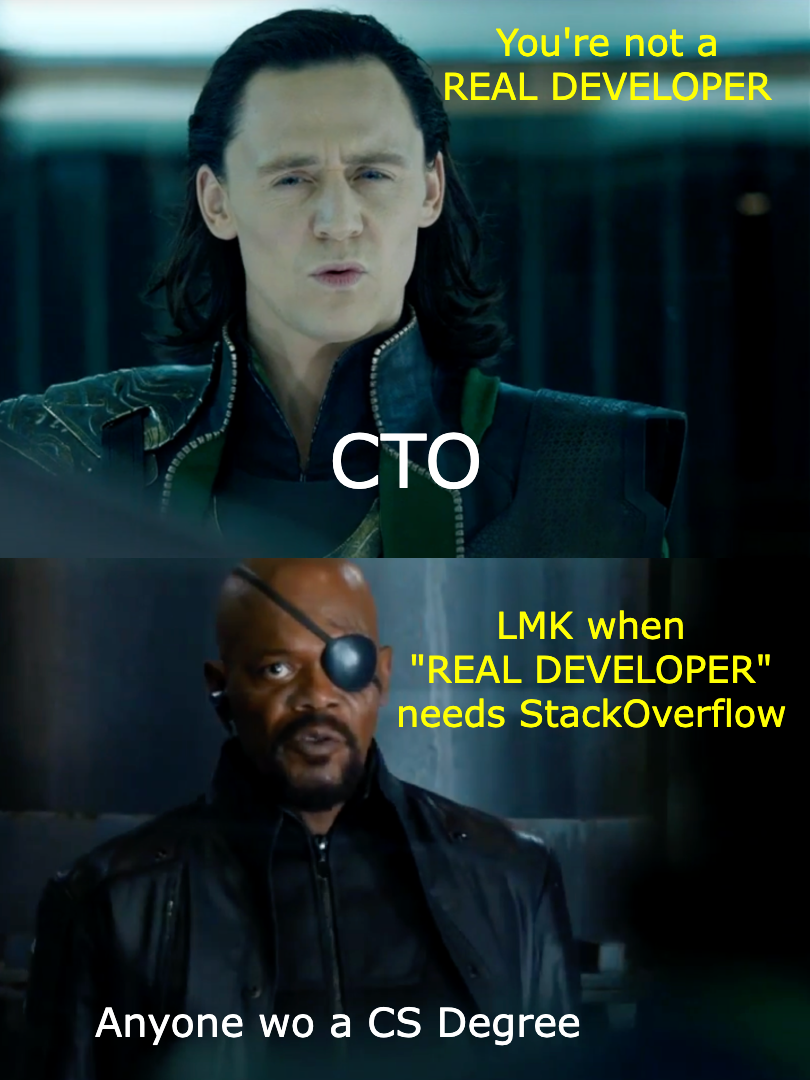
Research backs this up: 77% of computer science faculty literally disagree that "almost everyone can succeed in CS with sufficient effort." We've built an entire academic and professional culture around the idea that programming is for the chosen few. It's like a really nerdy version of Skull and Bones, except instead of secret handshakes, we gatekeep with brain teasers and syntax memorization tests.
The barriers we've erected are pervasive and multi-layered. The math myth is so debilitating that researchers call it "probably the most prevalent and most debilitating" barrier—we've convinced half the population they need advanced mathematics to write JavaScript. But even those who get past that myth hit the memorization wall: algorithm puzzles, LeetCode grinding, and framework trivia that research shows has poor correlation with actual job performance. We test people on reversing binary trees instead of understanding user problems. It's like requiring surgeons to solve crossword puzzles to prove they can operate.
But here's the thing: We've been lying. To ourselves, to our industry, and to everyone who thinks they "just aren't technical enough" to solve problems with code.
What It Used to Take (AKA The Bad Old Days)
I know because I lived it. When I made the transition from product management to engineering five years ago, it really WAS hard. Not because the problems were inherently complex, but because the tooling sucked and we made everything unnecessarily difficult.
Want to build a simple web app? First, memorize 47 different ways to center a div in CSS. Then understand the difference between let, const, and var in JavaScript—not because it matters for 99% of what you're building, but because some senior engineer will definitely ask you about it before being hired to add a button to a screen.
Need to make an API call? Hope you enjoy spending your time in the poorly written documentation of the network calling framework that was the favorite choice of an engineer long since fired for not working weekends (hint: its NEVER the basic JavaScript API fetch).
The dirty secret: Most of professional programming was reading GitHub and syntax memorization masquerading as problem-solving. We were human compilers, spending more time wrestling with our own opinions on using .forEach or .reduce on lists of data than actually thinking about what our users need.
To "break in", I spent months drilling myself on how to strings on LeetCode —not because learning how to write efficient code matters (though it does), but because memorizing esoteric solutions would open the doors to allow me to actually be creative with code… and pay the rent.
It was hazing, plain and simple. We made people jump through intellectual hoops to prove they belonged in our club.
What Actually Matters Now (Plot Twist: Gayle McDowell was wrong)
Then AI coding assistants happened, and suddenly all our carefully constructed barriers turned into a house of cards in a windstorm.
Here's what the research shows about modern programming requirements:
Mathematical Genius? Nah. Only specialized domains like machine learning actually need heavy math. For building normal software—websites, mobile apps, business tools—the math requirements are "minimal arithmetic." We've been acting like you need a PhD in mathematics to build a to-do list app.
Syntax Memorization? Please. Developers now report they're "most motivated to use AI programming assistants because they help reduce key-strokes, finish programming tasks quickly, and recall syntax." The thing I spent months memorizing? AI does it in milliseconds.
Here's what actually matters now:
- Problem Decomposition - Can you break big problems into smaller ones? This is literally how humans solve everything from planning dinner parties to launching rockets.
- Systems Thinking - Understanding how pieces fit together. CTOs now prioritize "the ability to understand how different parts of a solution work together and how to design for long-term performance and flexibility."
- Communication Skills - "The ability to think clearly and communicate precisely in natural language is becoming as important as traditional coding skills." You know what this is? It's explaining what you want clearly. Like asking your barista for a coffee.
- Quality Assessment - Here's the kicker: 84% of developers use AI tools but only 33% trust the output. The skill isn't generating code—it's knowing if the generated code is any good.
Notice what's NOT on this list? Advanced mathematics. Computer science degrees. Implementing algorithms from memory (quicksort, anyone?). Reciting complexity notation for functions you'll never optimize. Distinguishing array methods without looking them up. Solving contrived brain teasers under time pressure.
The New Reality: Your Aunt Could Probably Be a Developer
Modern software development isn't about being smarter than everyone else—it's about being better at collaborating with AI systems.
Most people are already qualified to solve problems with code. The research shows that "logical thinking and problem-solving skills matter far more than advanced mathematics" for programming success.
Can you plan a vacation? Congratulations, you can decompose problems. Can you explain to customer service what's wrong with your internet? You can communicate requirements clearly. Do you double-check your Amazon cart before buying? You can review AI-generated solutions.
The barriers that actually matter:
- Psychological, not technical - Imposter syndrome affects 52.7% of software engineers. Even people doing the job think they're not qualified.
- Cultural, not capability-based - We've created environments where asking questions feels dangerous instead of necessary.
- Historical, not current - People's assumptions about what programming requires are based on how things worked in 2015, not 2025.
How to Actually Become a Developer Today
Forget everything you've been told about needing to grind LeetCode for six months. Here's the real path:
1. Start with AI tools, not textbooks
Pick up Cursor, Claude, or GitHub Copilot. Build something you actually want—a website for your side business, an app to track your workouts, a tool to organize your photos. The AI will handle the syntax; you focus on describing what you want.
2. Learn by doing, not by studying
79% of bootcamp graduates get jobs within 6 months with 56% salary increases on average. You know why? Because they build real projects instead of memorizing algorithms they'll never use.
3. Practice the skills that actually matter
- Break big problems into small ones
- Ask foundational questions to build understanding - What's a variable? Why use this instead of that? Explain it like I'm five. AI won't judge you, won't sigh, won't make you feel dumb for not knowing. These learning questions are how you actually build expertise
- Ask problem-solving questions to tackle real challenges - How do I handle this edge case? What's the tradeoff between these approaches? This is literally 50% of professional programming
- Read the AI-generated code and ask "why" - Why did your copilot solve the problem this way? Could it be simpler? More efficient? More readable? This is the quality assessment skill that actually matters
- Test your solutions (does it work for edge cases?)
- Read other people's code and understand what it does
All of these skills share one thing: curiosity. The willingness to ask questions and keep learning instead of pretending you already know everything. Good news—that's not rare genius. It's just being interested enough to understand how things work.
4. Join communities, not classrooms
69% of professional developers are totally or partially self-taught. The people building your favorite apps didn't learn from formal CS programs—they learned from Stack Overflow, GitHub, and communities of people solving similar problems.
5. Accept that everyone feels like a fraud
Remember that 52.7% imposter syndrome rate? Even senior engineers at Google feel like they don't know what they're doing half the time. The difference between you and them isn't intelligence—it's that they've gotten comfortable being confused and figuring things out.
The Bottom Line
The programming priesthood is dead, and AI killed it.
We can keep pretending that software development requires rare genius-level talents, or we can accept that we've been gatekeeping a skill that's fundamentally about logical problem-solving—something humans are generally pretty good at.
Your recruiter was wrong. She absolutely could do what I do. So could your accountant, your teacher, your barista, and yes, probably your aunt who's "not technical" but somehow figured out how to use seventeen different social media platforms.
The question isn't whether you're smart enough to be a programmer. The question is whether the programming industry is finally ready to admit that we've been making this way harder than it needs to be.
Spoiler alert: With AI assistants handling the grunt work, we finally have to admit that the hard part was never the coding. It was always the thinking.
And thinking? That's something most people are surprisingly good at.


